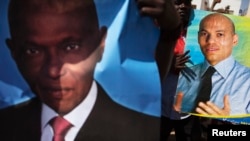In Senegal, the state has removed the prosecutor in the corruption trial of the former president's son, Karim Wade — the latest turn in what has been a tense and politically charged trial.
Special prosecutor Alioune Ndao was relieved of his duties Tuesday without explanation. He apparently got the news via text message while he was in court. The judge called a recess due to “an emergency.” The trial will resume December 1.
Ndao has been leading the investigation and prosecution of Wade that opened shortly after his father, Abdoulaye Wade, was voted out of office in March 2012. Wade managed a hefty government portfolio as a minister under his father.
Now he stands accused of illegally amassing $240 million via offshore companies and foreign bank accounts.
Senegal's justice ministry has not said why Ndao was removed, but some speculate he was preparing to investigate other officials based on evidence from the Wade trial.
Pulling the prosecutor off such a high profile case was a risky move on the part of the government, Senegalese political analyst Aly Ndiaye said.
“The fact that the government itself fired its own special prosecutor has undermined the credibility of the government evidence to a lot people in the public opinion," said Ndiaye said. "It [shows] that the government is not well-prepared to investigate or try Karim Wade. And it looks like they don’t know what they’re doing much.”
Wade’s lawyers have called the case a “political witch hunt” since the beginning. The government said it is part of larger efforts to increase accountability in the spending of public funds. Wade, whose supporters chant "Free Karim" during courtroom breaks, has been in jail since April.
That same phrase is spray painted on random buildings around Dakar.
Despite the support, Wade has not historically been popular among Senegalese. He suffered a humiliating defeat in 2009 when he ran for mayor of Dakar. Protesters who took to the streets in 2012 to protest his father's re-election bid accused him of trying to put his son into power.
Senegal is trying the younger Wade in a special court, the Court to Repress Illicit Enrichment, also known by its French acronym, the CREI. The court requires that the accused justify his wealth. Wade’s lawyers say this is fundamentally unfair, arguing it treats the accused as guilty until proven innocent.
The trial started in July and has routinely gotten bogged down in heated debates between the lawyers and the lead judge. Fewer than 10 of the 97 expected witnesses have taken the stand. Each witness is questioned by the prosecutor, then the defense attorneys, and finally by Wade himself, a process that can take days.
Wade often uses his time to interrogate the court, not the witness. He complains that he does not have access to evidence. The judge then cuts him off and tells a guard to return him to his seat.
Witness testimony has varied widely. Some witnesses such as Patricia Lake Diop, Wade’s notary, refused to answer questions.
Other witnesses have discussed their role in alleged wrongdoing. Wade’s former bodyguard Victor Kantoussan said he deposited nearly $200,000 on Wade’s behalf into two accounts that he said belonged to the former minister of interior.
A key sticking point is the absence of Wade’s alleged accomplice, Lebanese businessman Bibo Bourgi. He was hospitalized during his testimony in September. The court eventually accepted that he be evacuated to France for treatment. The court is yet to rule on his request for an additional 45-day medical leave.
Some speculate that Bourgi, a French citizen, will not return at all. Wade’s lawyers say Bourgi is a key witness and without him, his trial will not be fair.
The prosecutor and the court have not commented publicly since the trial opened.
If convicted, Wade could face 10 years in prison and lose his rights as a Senegalese citizen.





